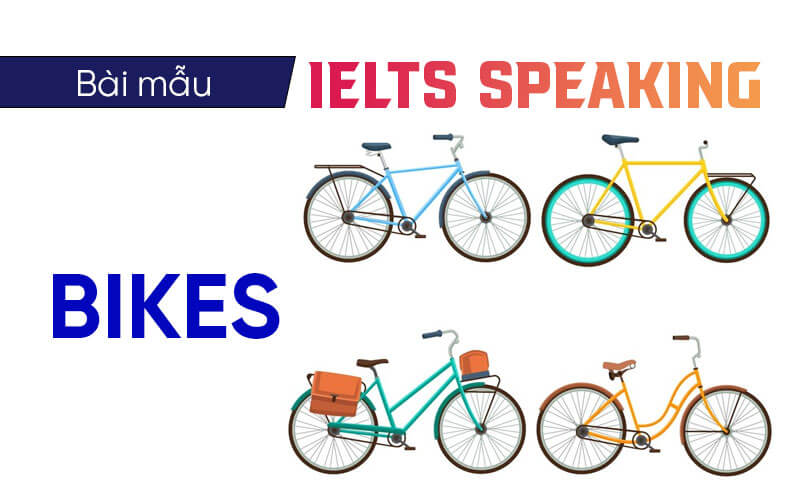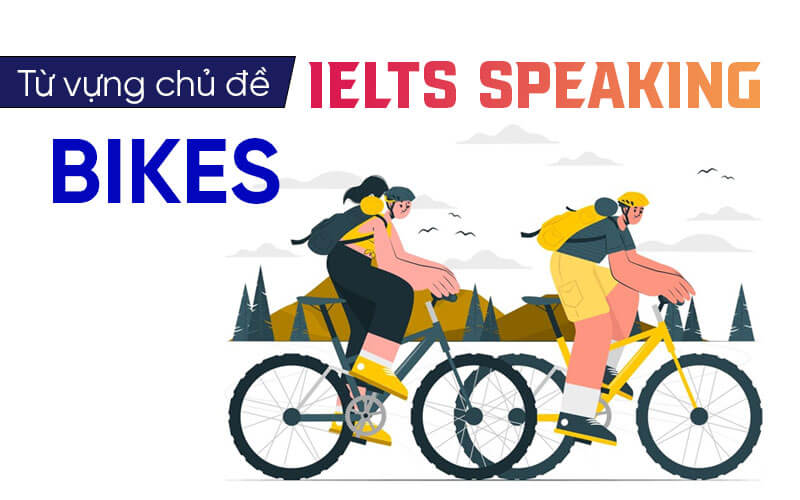Đội ngũ chuyên gia tại Smartcom English là tập hợp những chuyên gia đầu ngành trong lĩnh vực IELTS nói riêng và tiếng Anh nói chung. Với phương pháp giảng dạy sáng tạo, kết hợp với công nghệ AI, chúng tôi mang đến những trải nghiệm học tập độc đáo và hiệu quả. Mục tiêu lớn nhất của Smartcom Team là xây dựng một thế hệ trẻ tự tin, làm chủ ngôn ngữ và sẵn sàng vươn ra thế giới.
Bắt đầu ôn thi với đề IELTS Speaking Bikes cũng giống như bắt đầu tập đi xe đạp vậy, chẳng ai tự nhiên mà có thể “chạy bon bon” trên chiếc xe hai bánh ấy.
Và nếu bạn cũng đang có những nỗi lo lắng như:
- Thiếu từ vựng cần thiết liên quan tới chủ đề Bikes
- Gặp khó khăn với việc trình bày ý tưởng của bản thân
- Hay chỉ đơn giản là muốn “nâng cấp” câu trả lời trở nên càng tốt hơn nữa
Thì bài viết này của Smartcom chính là điểm đến phù hợp nhất với bạn đó! Bởi bài viết này sẽ giúp bạn “điểm mặt” các từ vựng về Bikes, các câu hỏi thông dụng và các câu trả mẫu mà bạn hoàn toàn có thể tham khảo để áp dụng vào bài thi nói của mình! Hãy đọc tiếp nhé!

Bài mẫu IELTS Speaking Bikes – Part 1
Question 1: Do you own a bike?
No, I do not own a bike. The city in which I reside is quite crowded, making it challenging to navigate with a bicycle. The heavy traffic and limited space for cycling create a rather unsafe environment.
Question 2: Why do you think people ride bikes in urban areas?
People often choose to ride bikes in urban areas for several reasons. Firstly, cycling can be a more eco-friendly alternative to driving, helping to reduce pollution. Additionally, it can be a convenient way to avoid traffic congestion and easily access various locations within the city.
Question 3: Do you think biking is a good form of exercise?
Absolutely. Biking is an excellent form of exercise as it promotes cardiovascular health and enhances overall fitness. It engages multiple muscle groups and can be a pleasant way to incorporate physical activity into one’s daily routine.
Question 4: Are there any bike lanes in your city?
Unfortunately, our city lacks sufficient dedicated bike lanes. While there are some areas designated for cyclists, they are often unclear or poorly maintained, which discourages people from using bikes as a mode of transport.

Bài mẫu IELTS Speaking Bikes – Part 2
Describe a bike you would like to own
You should say:
- What type of bike it is
- Why you would like to own it
- How you would use it
- And explain what advantages it would bring you
- —
I would like to talk about a bike I envision owning in an ideal scenario. Although I currently do not own a bike due to the overcrowded nature of my city, I often fantasize about the freedom and convenience that cycling can provide.
If I were to choose a bike, it would be a lightweight hybrid model, combining features of both road and mountain bikes. This would enable me to navigate through narrow city streets as well as enjoy leisurely rides in nearby parks during weekends. I imagine it would have a comfortable seat and smooth gears for easy riding, which would be essential for navigating the occasional hills in the area.
In my city, the heavy traffic and crowded sidewalks often make cycling impractical, as safety can be a concern. However, the environmental benefits of biking and the potential for improved health and well-being are compelling reasons for me to consider it. I would love to use this bike for short trips to work, and for errands, as it could help me avoid the stress of public transportation.
In conclusion, while I do not currently own a bike due to the challenges of city life, I can certainly appreciate the advantages it would bring if circumstances allowed.
Bài mẫu IELTS Speaking Bikes – Part 3
Question 1: Let’s discuss some broader topics related to bicycles. Why do you think bicycles are considered an environmentally friendly mode of transport?
Bicycles are deemed environmentally friendly primarily because they produce zero emissions during use. They do not contribute to air pollution or greenhouse gas emissions, which are significant concerns associated with motor vehicles. Additionally, cycling helps reduce traffic congestion, thereby lessening the urban heat effect caused by heavy vehicular traffic. The use of bicycles also promotes more sustainable urban planning by facilitating the development of bike lanes and reducing the need for expansive road infrastructure.
Question 2: What impact do you believe increased cycling might have on public health?
Increased cycling can have profound positive effects on public health. Firstly, it serves as an excellent form of cardiovascular exercise, which enhances overall fitness and aids in the prevention of lifestyle-related diseases such as obesity, heart disease, and diabetes. Moreover, cycling can reduce stress levels due to the physical activity and the opportunity to enjoy the outdoors. As more individuals choose bicycles over cars, we could also see a decline in pollution-related health issues, benefitting the wider community.
Question 3: Are there any potential drawbacks to a rise in cycling as a primary mode of transportation?
While cycling has many advantages, there are certainly potential drawbacks. One major concern is safety; cyclists share the road with motor vehicles, which can lead to accidents, particularly in areas lacking proper infrastructure, such as dedicated bike lanes. Additionally, adverse weather conditions can deter individuals from cycling, limiting its practicality. Furthermore, there may be issues related to the accessibility of bicycles for individuals who cannot afford them or those with physical disabilities, which may exacerbate inequalities in transportation access.
Question 4: In your opinion, how can governments encourage cycling as a viable mode of transport?
Governments can encourage cycling through various strategies. One effective approach is the investment in cycling infrastructure, such as safe bike lanes and parking facilities. Education and awareness campaigns can also promote the benefits of cycling to the public. Additionally, implementing initiatives like bike-sharing programs and offering incentives for cycling, such as tax breaks or subsidies for purchasing bicycles, could further motivate individuals to opt for this eco-friendly transport. Creating a culture that values and prioritizes cycling will ultimately require a multifaceted, community-focused approach.
Từ vựng chủ đề IELTS Speaking Bikes
- Bike/bicycle (n): xe đạp
- Gear (n): bánh răng
- Eco-friendly/environmentally friendly (adj): thân thiện với môi trường
- Convenient (adj): tiện lợi
- Cycling/riding/biking (n): việc/hành động đạp xe
- Physical activity (n): hoạt động thể chất
- Bike lane/cycling path (n): làn đường cho xe đạp
- Traffic congestion (n): tắc đường

Kết bài
Trên đây là những từ vựng và các câu trả lời mẫu mà Smartcom đã tổng hợp ra, hi vọng rằng chúng đã phần nào giúp ích được cho bạn!
Đừng quên, Smartcom đang có Khóa IELTS Advanced chuyên dành cho các bạn muốn tập trung ôn luyện IELTS vì nhiều mục đích khác nhau: như xét tuyển Đại học, du học, hay là đang muốn xin việc cho vị trí yêu cầu tiếng Anh chẳng hạn! Khóa học này sẽ tập trung vào cả 4 Kỹ năng chính là Nghe, Nói, Đọc, Viết, còn giúp bạn tích lũy kinh nghiệm thi qua việc thử sức với nhiều dạng đề thi “thử mà như thật” nữa! Quan trọng nhất chính là không giới hạn số lần thi đâu nhé, bạn hoàn toàn có thể thi lại bất cứ lúc nào mà vẫn được giáo viên quan tâm sửa lỗi như lần đầu!
Nếu bạn có chút quan tâm đến Khóa IELTS Advanced của Smartcom English, hãy cân nhắc tới việc nhắn tin cho trung tâm để được tư vấn chi tiết hơn nhé! Bạn cũng không cần phải lo lắng khi gặp phải đề IELTS Speaking Bikes nữa, bởi biết đâu sắp tới, chính bạn lại là người tự tin “xử lí” mọi loại đề thi thì sao!
Mong có cơ hội được gặp bạn!
Kết nối với mình qua
Bài viết khác


![[PDF + Audio] Tải Sách IELTS Cambridge 19 (Kèm đáp án)](https://smartcom.vn/blog/wp-content/uploads/2024/06/ielts-cambridge-19_optimized.png)


![[PDF + Audio] Tải Sách IELTS Cambridge 17 (Kèm đáp án)](https://smartcom.vn/blog/wp-content/uploads/2024/07/sach-ielts-cambridge-17_optimized.jpg)

![[PDF + Audio] Tải Sách IELTS Cambridge 15 (Kèm đáp án)](https://smartcom.vn/blog/wp-content/uploads/2024/07/ielts-cambridge-15_optimized.jpg)








